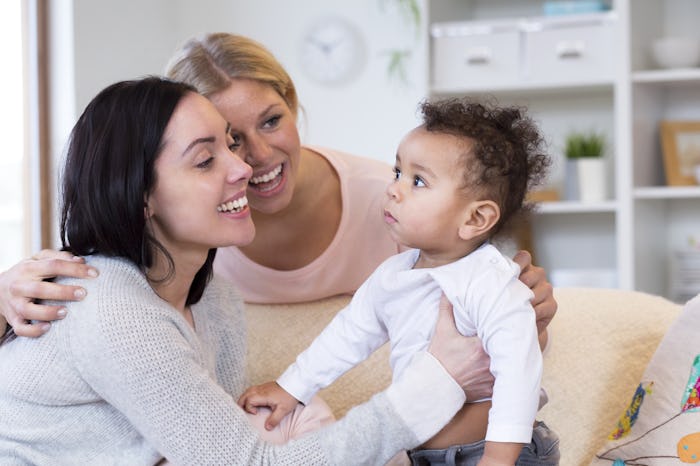Life

The One Question Every Grown-Ass Couple Asks 3 Months After Having A Baby
The first few months of parenthood are a blur of excitement and fear, frustration and exhaustion. Everything you do, you do in survival mode, meaning you'll probably laugh hysterically at a baby fart at 3:56am or scream at your partner for not closing the bathroom door while they pee. Every grown-ass couple is well aware that procreating changes a relationship, which is why there's one question grown-ass couples ask, 3 months after having a baby. Until mind-reading is an actual thing, it's important to check in with your partner once the dust settles and the air clears and you're finally starting to get a handle on the craziness that is parenthood. Or, you know, something that sort of resembles a handle.
So, should you just be checking for a pulse? Seeing whether an extra cup of coffee should be incorporated into your morning routines? If they want to run away and join the circus and ditch this whole parenting thing? No, the most important question that every grown-ass couple asks each other, 3 months into parenthood, is:
What is still hard for you and how can I help?
Okay, that's technically two questions but they're equally important and deserve to share the same space because, well, even if you're starting to feel comfortable with the whole parenting thing, your partner might not be, or visa versa. One of the easiest ways to remain a functional unit is to check in and figure out how you can best support one another, as your needs and your partner's needs and the baby's needs will, inevitably, change (again and again and again).
I can't tell you how important this step is if you're going to keep your relationship with your partner healthy, especially while you both navigate an incredibly challenging time. Things may be going swimmingly with your baby, and you guys may have totally gotten the knack of parenthood, but more often than not, you get hit upside the head with one unforeseeable challenge after the other. You're left barely coping with your own damn self, never mind taking your partner and their needs into consideration. Colicky babies create parents who snap at each other, babies who don't sleep (and therefore keep you from sleeping) end up with parents who secretly resent each other, and even the easiest of babies provide their parents with challenges that test their patience and resolve.
Personally, things changed for the better when my husband took the first step and asked me if I was okay and/or if there was anything he could do to support me better. I was just beginning my downward spiral into postpartum depression, and was angry at a lot of things, seemingly all of the time. I also felt like I couldn't ask for what I needed. I felt like I should have this "mom thing" down so I was constantly feeling guilty, while simultaneously feeling resentful that no one could read my mind and just give me what I needed without an expressed prompt. One afternoon, when I was stomping around the house having just moved from napping my 2-year-old to breastfeeding my 2-month-old, and then having to trouble shoot dinner for family members who were visiting, my partner stopped and asked me what I needed. Everything I was doing was immediately halted, as I was unable to articulate the roiling emotions inside of me. I was so thankful that he asked and so inundated with all the things I really did need. As time went on, I began to express things better, and got what I needed so that I could continue being the best mom I can possibly be.
Once my partner started the conversation, I was reminded that it was just as important for me to check in with him, too. Our society tends to think of mothers as the primary caregivers, and fathers as "back up" for when mom wants and/or needs a break. And even if you aren't part of a heteronormative relationship, most couples tend to comply with the aforementioned social standard and pick someone who is predominantly the "caregiver" and someone who is predominantly the "back up". That isn't (or shouldn't be) the case, and as soon as I asked my partner what he was still struggling with and what I could do to help, we became a better, more cohesive parenting unit. We became better parents.
A good partnership is based on mutual support, but sometimes that's difficult to achieve because guilt is a thing and exhaustion is a thing and forgetting that your partner isn't a superhuman void of very valid needs is a definite thing. It's nobody's fault, and it's why this dialogue is such an important one begin, as early as possible. It will help make your relationship stronger, despite the challenging times, and isn't that what we all want?